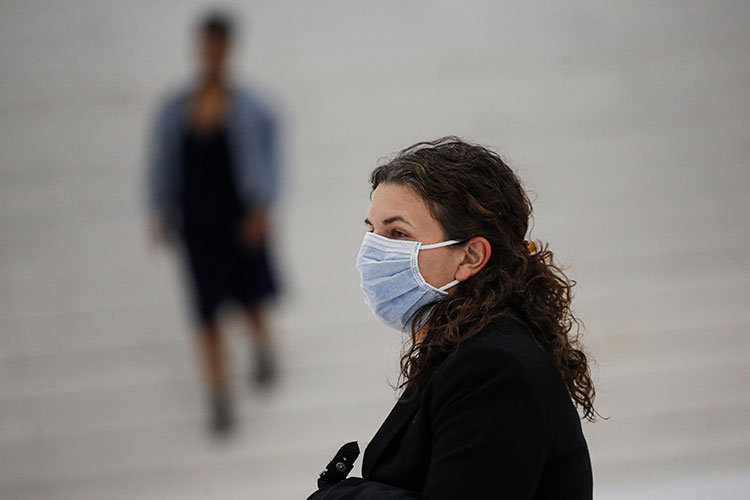
More than 27 million Americans live without health insurance and may opt to delay testing or treatment for coronavirus over concerns about cost, potentially worsening the extent of outbreaks. (AP photo by John Minchillo)
While public health officials and policymakers race to contain the spread of the novel coronavirus COVID-19 in the United States, they must also grapple with a daunting reality: Approximately 27 million Americans, or about 9% of the population, live without any form of health insurance. In the state of California, those without insurance number about 3 million and about 7.5% of the population.
As of Monday, March 9, more than 580 cases of the novel coronavirus COVID-19 have been confirmed in the United States, with 230 of those added just over the weekend. As testing ramps up around the country and these numbers continue to rise, it is inevitable that some of the affected will be without health insurance.
Berkeley News spoke with health policy and management expert Stephen Shortell about how America's mix of public and private health insurance and the vast number of uninsured may impact the spread of the virus, and about what the solutions may be moving forward. Shortell is Distinguished Professor of Health Policy and Management Emeritus and dean emeritus at Berkeley's School of Public health and also serves as co-director of the Center for Healthcare Organizational Innovation Research (CHOIR) and the Center for Lean Engagement and Research in Healthcare (CLEAR).

Stephen Shortell is Distinguished Professor of Health Policy and Management Emeritus and dean emeritus at Berkeley's School of Public health.
Berkeley News: How does our health care insurance system compare with other countries facing coronavirus outbreaks right now, such as Italy and South Korea? Do you think our patchwork system could make outbreaks worse?
Stephen Shortell: Financial access to care is simply not a problem in most other developed countries, like Italy and South Korea, and many others affected or that will be affected by the outbreak.
The degree of financial coverage for health care is not an issue with regard to the initial outbreak of infectious diseases. But it can accelerate the spread to the extent that the initial people affected delay getting tested and getting their symptoms diagnosed because they lack insurance coverage or have no regular source of care. This is the added complication and challenge we have in the U.S.
How is our current health insurance system equipped to handle costs related to emerging diseases, like coronavirus?
For those without health insurance coverage who may need care, it will be provided by doctors and hospitals as "free care" without reimbursement. The extent to which those with health insurance coverage will have their coverage pay for the cost of their care will depend on the nature of their policy. In recent years, more care is paid out of pocket by consumers in the form of high deductibles, given the rising cost of care for which many employers are asking consumers to pay more. Those people with current chronic illnesses, such as diabetes and asthma, are more likely to experience more severe symptoms from the coronavirus, and this may result in exacerbations of their underlying conditions and add up to greater costs to treat.
Is there any evidence that people who are uninsured are more or less likely to get the virus?
Those without insurance tend to be lower income, have less than high school education, work in low wage jobs, live in areas that have more pollution and fewer health resources, and generally are in poorer health. Thus, they may be particularly susceptible/vulnerable/at risk for the coronavirus.
To my knowledge, none of the statistics so far have broken out those affected by insurance status or any other socio-demographic characteristics of the people involved. On the one hand, those without coverage who are unemployed may be more likely to stay at home and not be carriers of the virus or be exposed to it. They are certainly less likely to travel. But, on the other hand, those who are employed are more likely to go to work even when they are ill and should stay at home, because the low wage jobs typically do not have good sick leave policies, and people need the income.
President Trump has proposed using national disaster funding to pay for coronavirus treatment for people who are uninsured. Do you think this is a viable option for making up gaps in insurance coverage?
Yes, we may need to activate the national disaster funding to deal with the problem. It may be the price the current administration and Congress will need to pay for supporting policies that have eroded the Affordable Care Act, resulting in an increase in the number of uninsured.
California Gov. Gavin Newsom has ordered that insurance companies waive the fee for coronavirus testing and screening in the state. Do people who are uninsured or with high-deductible plans have any other recourse for covering unexpected medical bills related to coronavirus?
Currently, there is no recourse for people receiving surprise medical bills related to the coronavirus, but there are some bills designed to eliminate surprise medical billing, and not just for coronavirus, (that are) germinating in Congress and various states.
Based on your research, what is the best solution for protecting Americans in the face of the potentially high costs of emerging diseases, like the coronavirus?
Universal health insurance coverage is needed. It doesn't have to be single payer; there are a lot of ways of getting there. And in California, we're working on that. Of course, at the federal level, a lot depends on the election. The number of uninsured has increased as a result of the current administration's elimination of key features of the Affordable Care Act. We do not know how many of those with the coronavirus are uninsured, but having universal health insurance coverage would eliminate financial barriers to testing and treatment.






